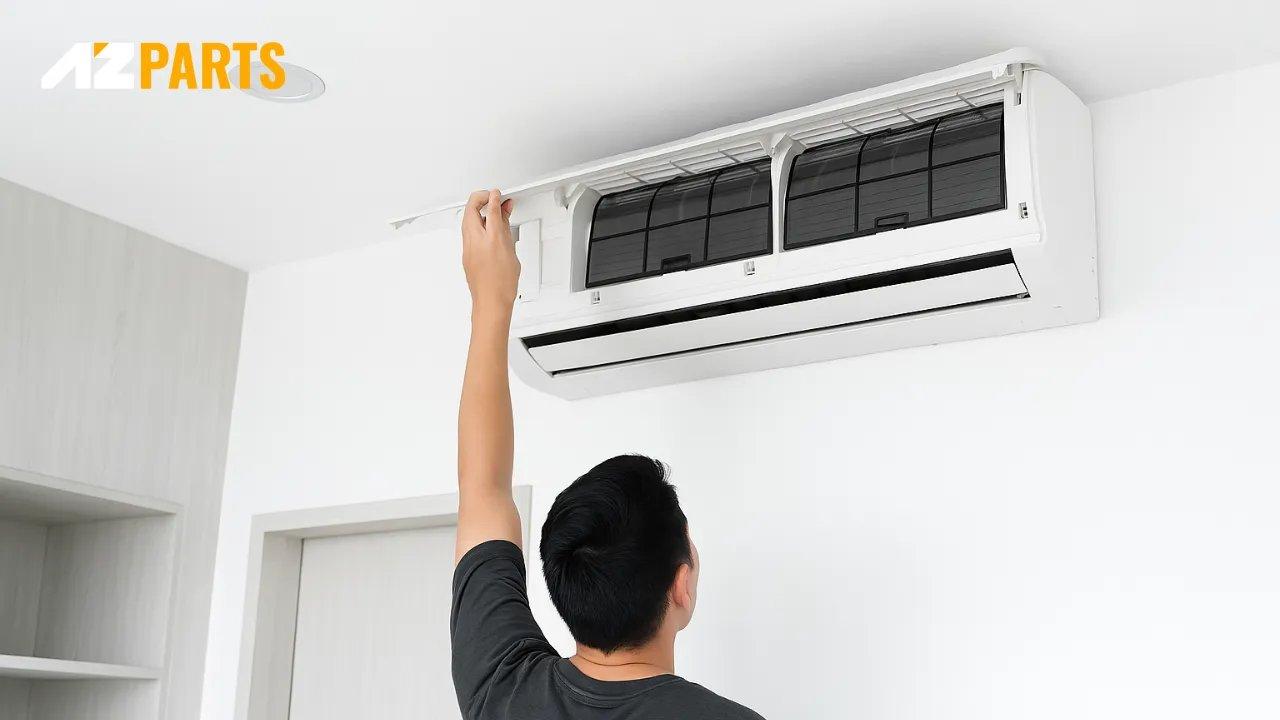Repair help
Air Conditioner Making Noise? Common Noise and How to Fix
AZparts Team
Updated on July 25, 2025
9 min read
Is your air conditioner making noise that keeps you up at night or interrupts your comfort? You’re not alone. Strange sounds from an AC unit, whether banging, screeching, or buzzing, are often early signs of mechanical problems that shouldn’t be ignored. In this guide, AZParts will help you identify what each sound means and show you how to fix common AC noise issues before they turn into costly repairs.
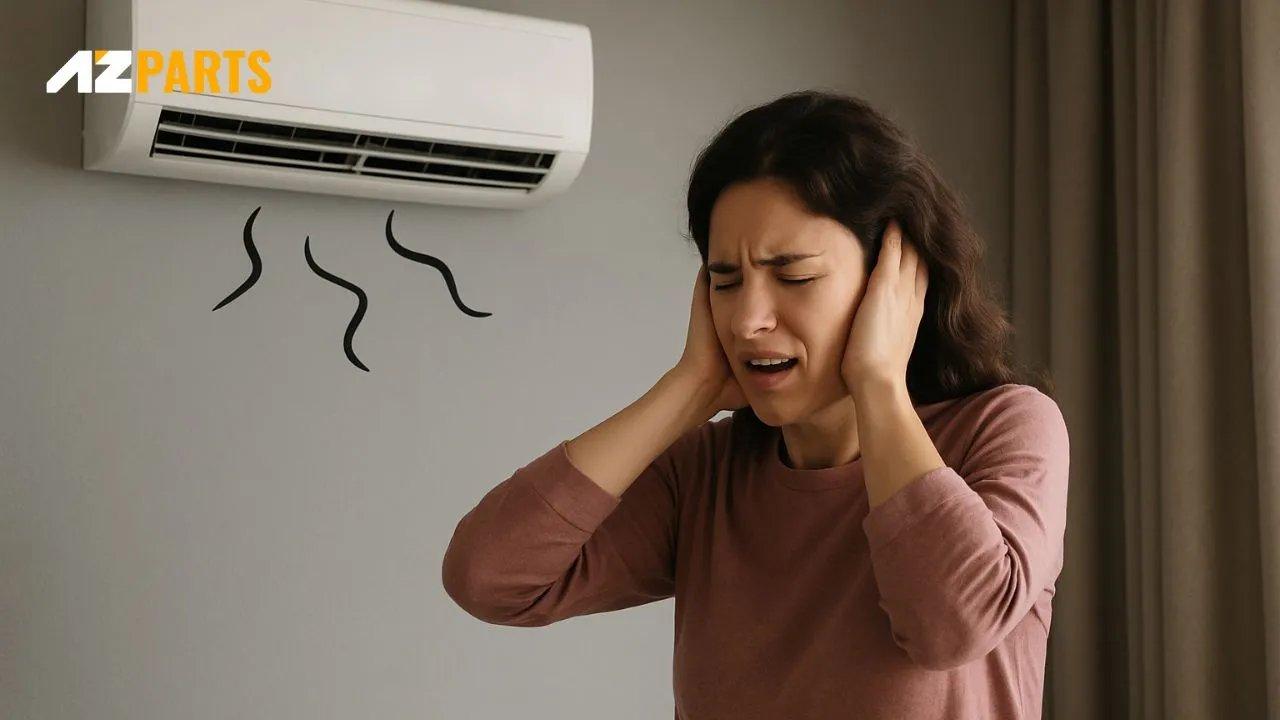
1. Common AC Noises & How to Fix Them
If your air conditioner is making strange or loud noises, it may be signaling an internal issue that needs attention. Identifying the type of sound and its cause can help prevent further damage and costly repairs. Below are two of the most common AC noises and how to address them.
1.1 Banging or Clanking
A banging or clanking noise often indicates a problem with the compressor. The compressor is responsible for circulating refrigerant throughout the AC system. Over time, internal components inside the compressor can become loose or detached, especially as the unit ages. When these loose parts hit the walls of the compressor casing, they produce a banging or rattling sound.
Since compressors are sealed units and not designed to be disassembled easily, repairing them is not always feasible. In many cases, the best solution is to replace the entire compressor or invest in a new energy-efficient air conditioner. If your AC starts making banging sounds, you should turn off the system and contact a licensed HVAC technician for a thorough inspection.
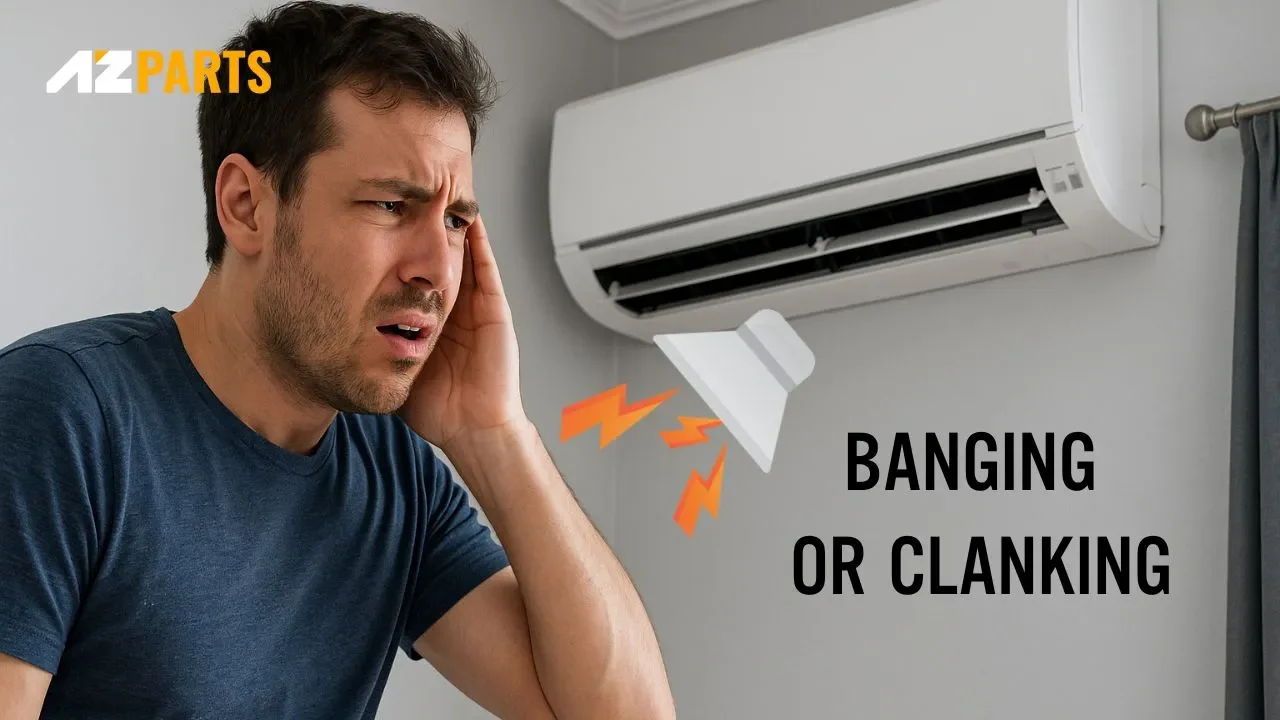
When the loose parts hit the walls of the compressor casing, they produce a banging or rattling sound (Source: AZParts)
1.2 Screeching or Squealing
A screeching or squealing noise usually points to a malfunctioning fan motor in the outdoor condenser unit. This motor helps expel heat from the refrigerant, and any damage or wear can lead to loud, high-pitched sounds during operation.
In some cases, the screeching may come from a damaged blower fan motor located inside the house. The blower fan plays a key role in circulating air through your ducts, and worn bearings or a loose fan belt can also be the source of the noise.
If you hear a screeching or squealing noise, turn off your air conditioner right away to avoid further damage. Then, inspect the unit for common causes such as a worn fan belt, damaged blower motor, or dry motor bearings. Depending on what you find, you can try tightening the belt, applying lubricant to the bearings, or replacing faulty parts using your owner's manual as a guide.
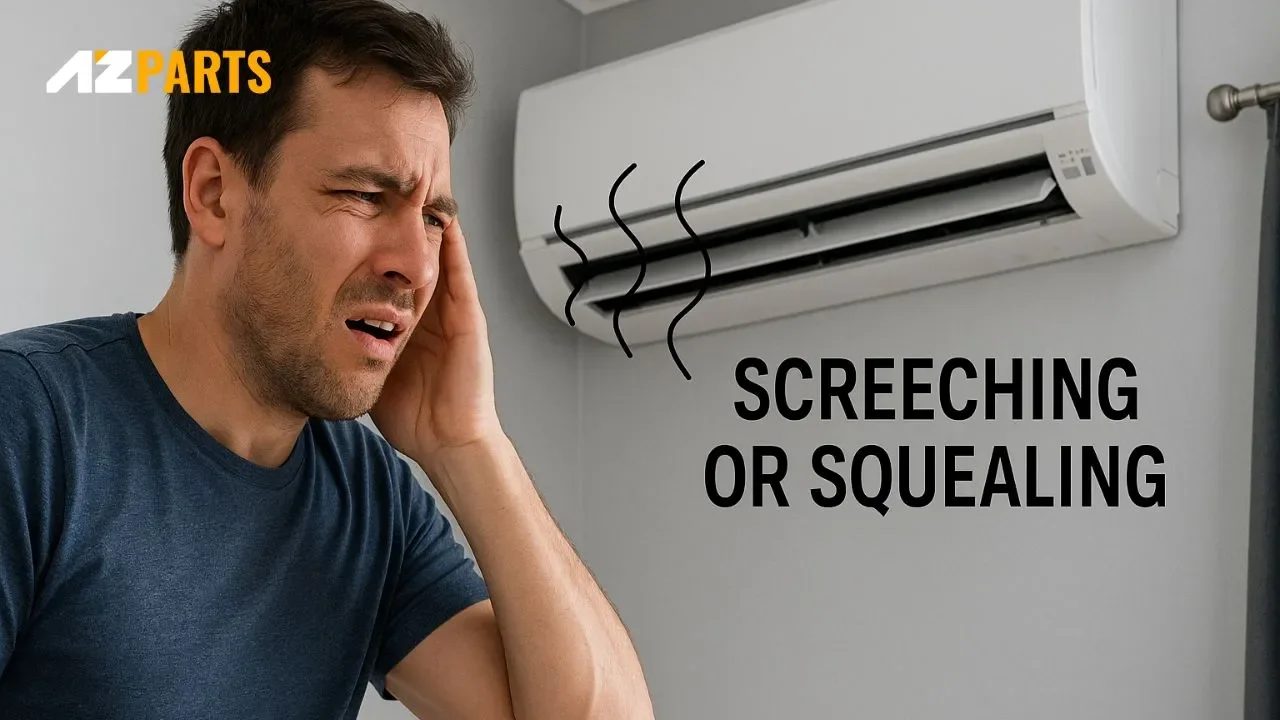
In some cases, the screeching may come from a damaged blower fan motor located inside the house (Source: AZParts)
1.3 Buzzing or Humming
A buzzing or humming noise from your air conditioner is often a warning sign of mechanical or electrical issues. One of the most common causes is a defective contactor relay switch. This component helps activate the outdoor condenser unit when it receives a signal from the thermostat.
Buzzing sounds may happen if the outdoor fan blades are unbalanced or loose. You should check the blades and tighten any loose screws or fasteners. A buzzing noise can also result from a dirty condenser coil, so cleaning the coil with a soft brush or coil cleaner may help reduce the sound. Inspect the unit for other loose parts or debris near the copper refrigerant lines, and remove any obstructions you find. While some buzzing may indicate more serious issues like a refrigerant leak, performing a careful inspection and basic maintenance can help identify and address simple causes early on.
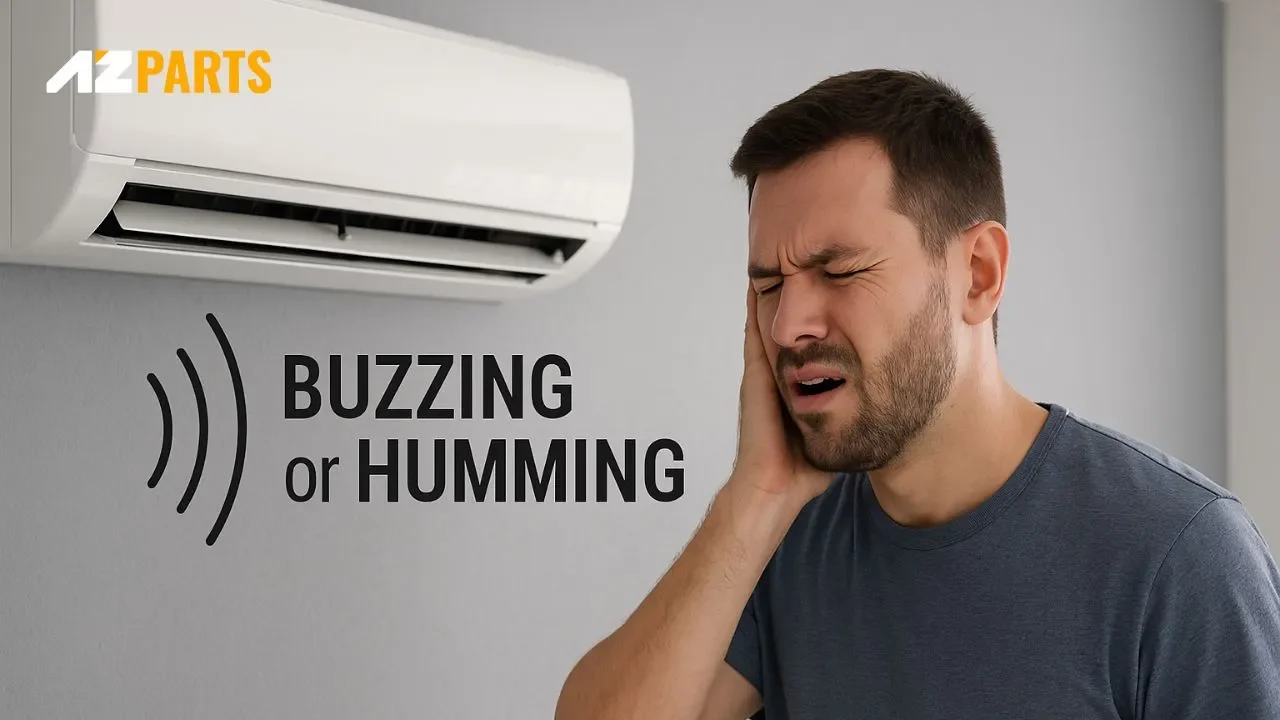
Since electrical and refrigerant issues can lead to serious damage, do not ignore a buzzing or humming sound (Source: AZParts)
1.4 Clicking or Tapping
It is normal to hear a soft clicking sound when your air conditioner starts or stops a cooling cycle. However, if the clicking continues while the system is running, this could signal a deeper issue. One likely cause is a faulty thermostat that is failing to send proper signals to your AC unit. This malfunction can disrupt the cooling cycle and cause the system to click repeatedly.
Clicking or tapping may also result from loose electrical components or relay issues within the control panel. If you hear persistent clicking, avoid trying to fix the thermostat or internal components on your own. Instead, call a qualified HVAC contractor to inspect the system and perform any necessary repairs safely.
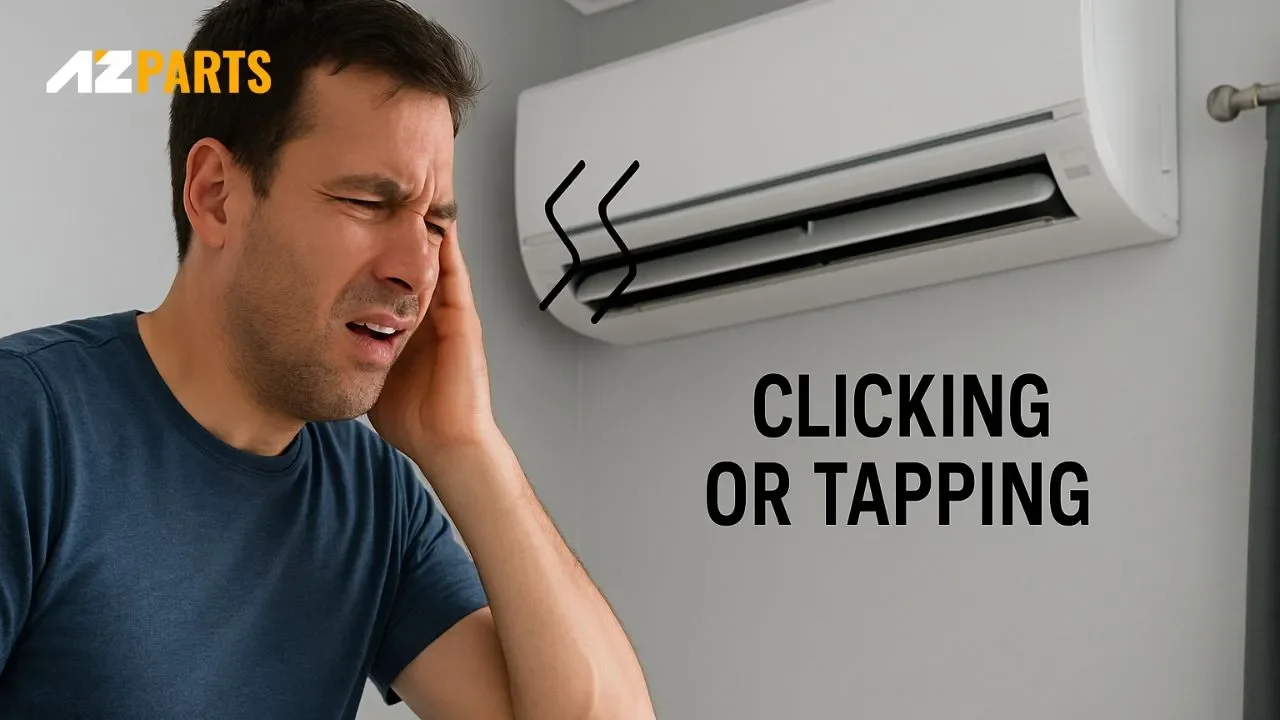
If the clicking continues while the system is running, this could signal a deeper issue (Source: AZParts)
1.5 Hissing or Bubbling
A hissing noise from your air conditioner often indicates a potential air duct leak in your home. When there is a moderate to severe leak, pressurized air escapes, creating a sharp hissing sound. In some cases, this noise may also result from a malfunctioning expansion valve or an air filter that does not fit your system properly.
Bubbling sounds are often caused by moisture buildup in the system, typically due to a crack, hole, or blockage in the condensate drainage pipe. You can start by turning off the unit and inspecting the drain line for visible damage or clogs. If you find any small cracks, sealing them with waterproof tape or replacing the section of tubing may help. Be sure to check that the drainage line is properly positioned and secured to ensure smooth water flow and prevent future bubbling noises.
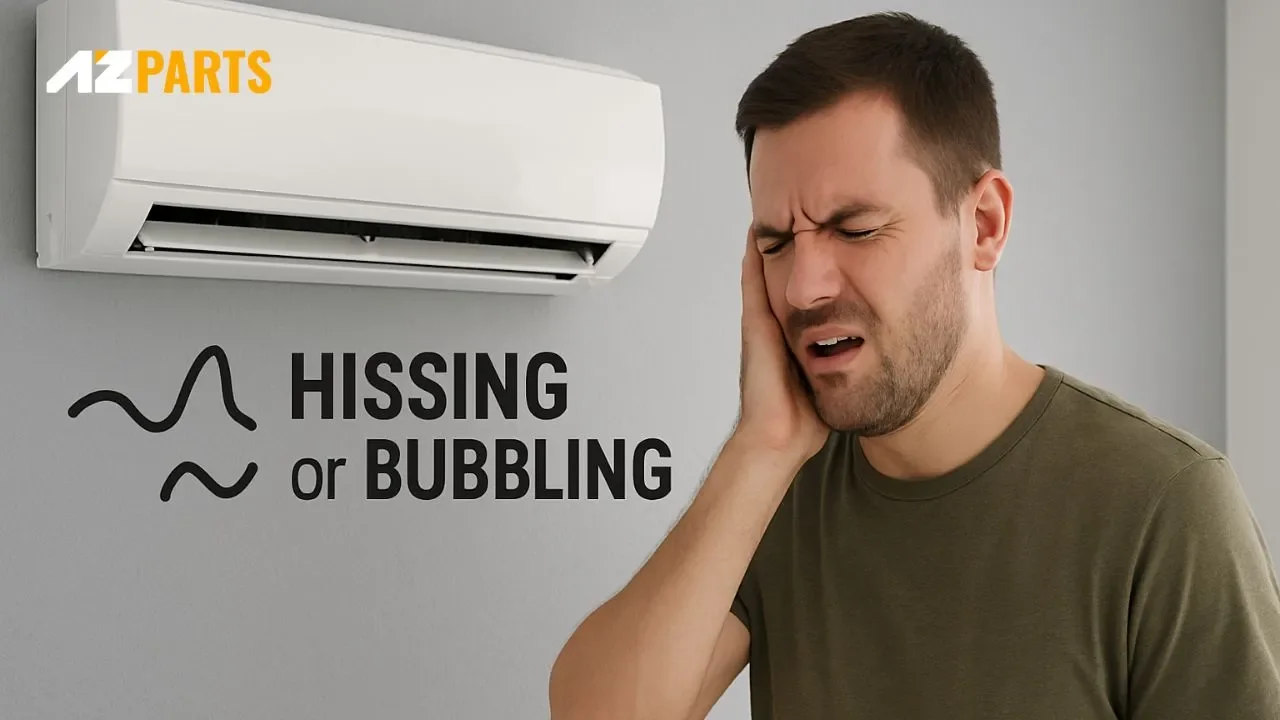
A hissing noise from your air conditioner often indicates a potential air duct leak (Source: AZParts)
1.6 Rattling or Vibrating
A rattling or vibrating sound coming from your air conditioner could have a simple or serious cause. In the best case, this noise may be caused by loose debris such as twigs, leaves, or dirt caught in the outdoor condenser unit. You can fix this by turning off the power and carefully removing the debris from the unit.
If the rattling continues after removing debris, a loose or damaged electrical contactor may be the cause. You should disconnect the power, open the panel, and inspect the contactor for signs of wear or burning. If it looks damaged, replace it with a compatible part and ensure all wires are securely connected before turning the unit back on.
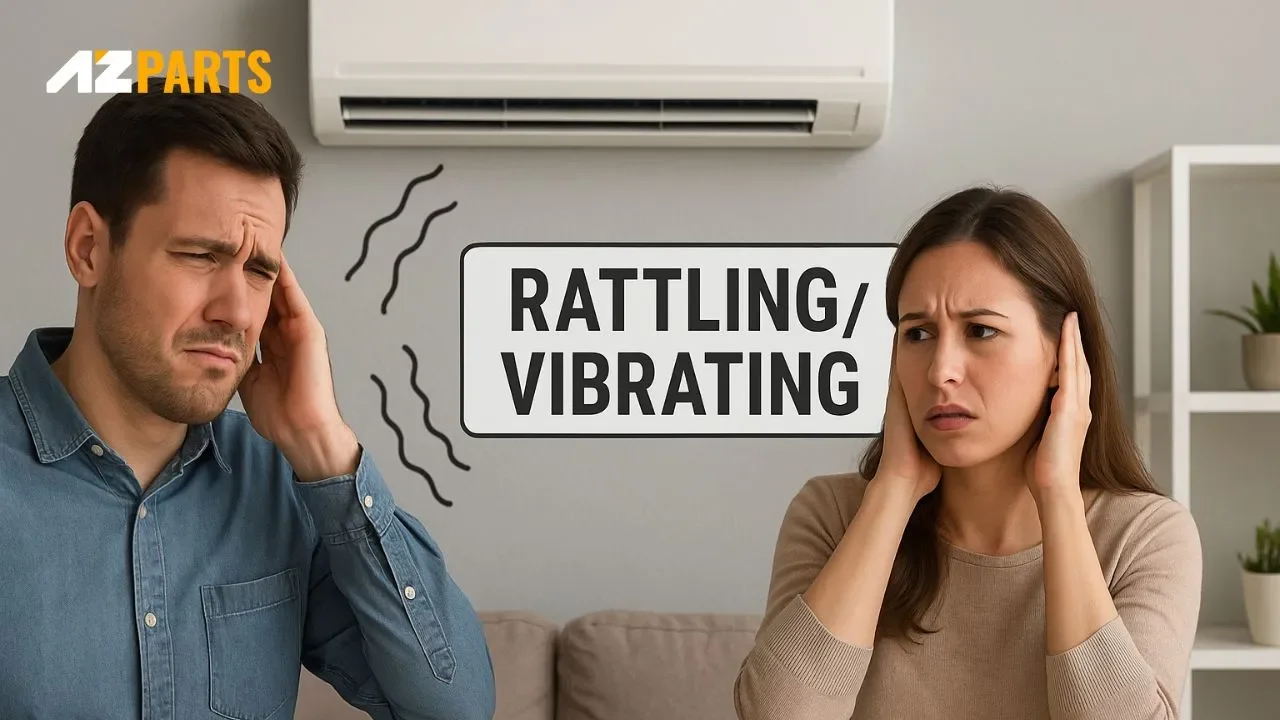
A rattling or vibrating sound may be caused by loose debris caught in the outdoor condenser unit (Source: AZParts)
2. Normal Air Conditioner Sounds
Not all air conditioner noises are signs of a problem. Some sounds are part of your system’s normal operation. Recognizing these familiar sounds helps you distinguish between routine functioning and potential issues that require attention.
2.1 Whooshing Airflow Sound
It is completely normal to hear a steady whooshing sound as air flows through the vents in your home. This sound simply indicates that the system is running and circulating cooled air throughout the space. If the whooshing becomes unusually loud, it could suggest a dirty air filter or obstructed vents, but in general, a gentle whooshing sound is expected.
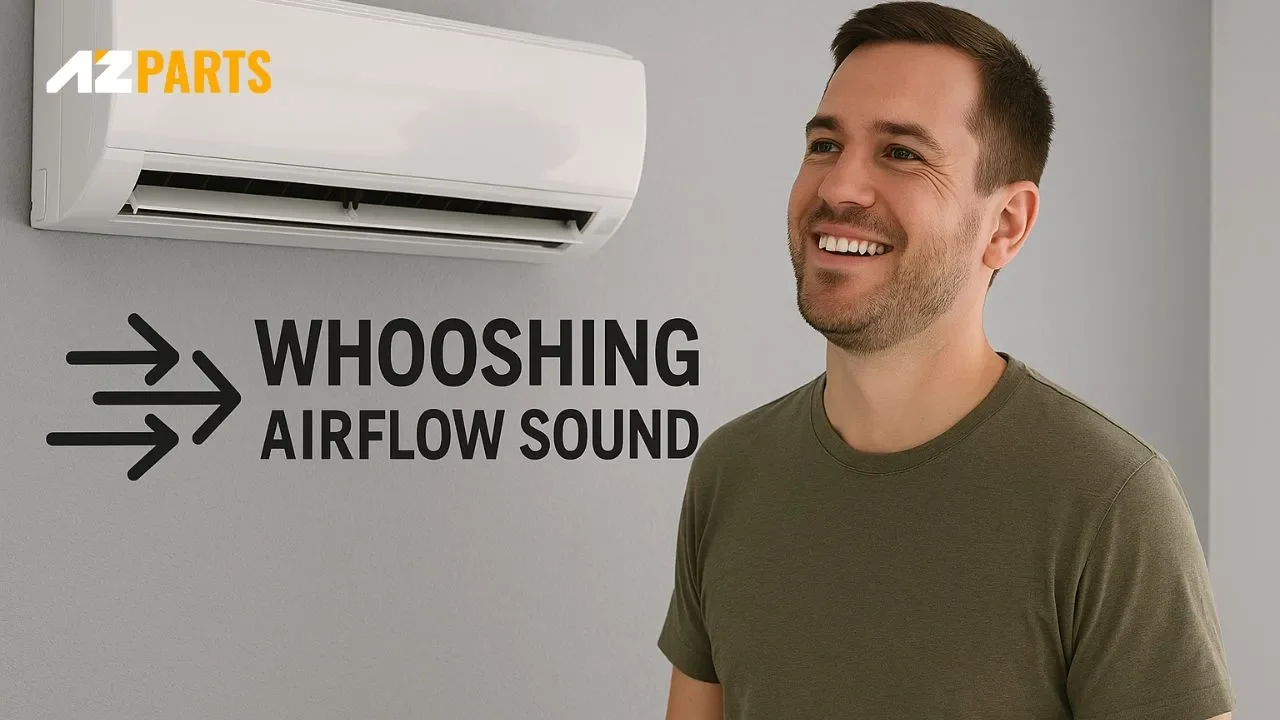
It is completely normal to hear a steady whooshing sound as air flows through the vents (Source: AZParts)
2.2 Soft Clicking When Starting or Stopping
A soft clicking sound is commonly heard when your air conditioner turns on or off. This noise comes from electrical components like relays or the thermostat signaling the system to start or stop a cooling cycle. As long as the clicking only occurs during these transitions, there is no cause for concern. However, if clicking becomes constant or happens erratically, it could indicate a faulty component that needs attention.
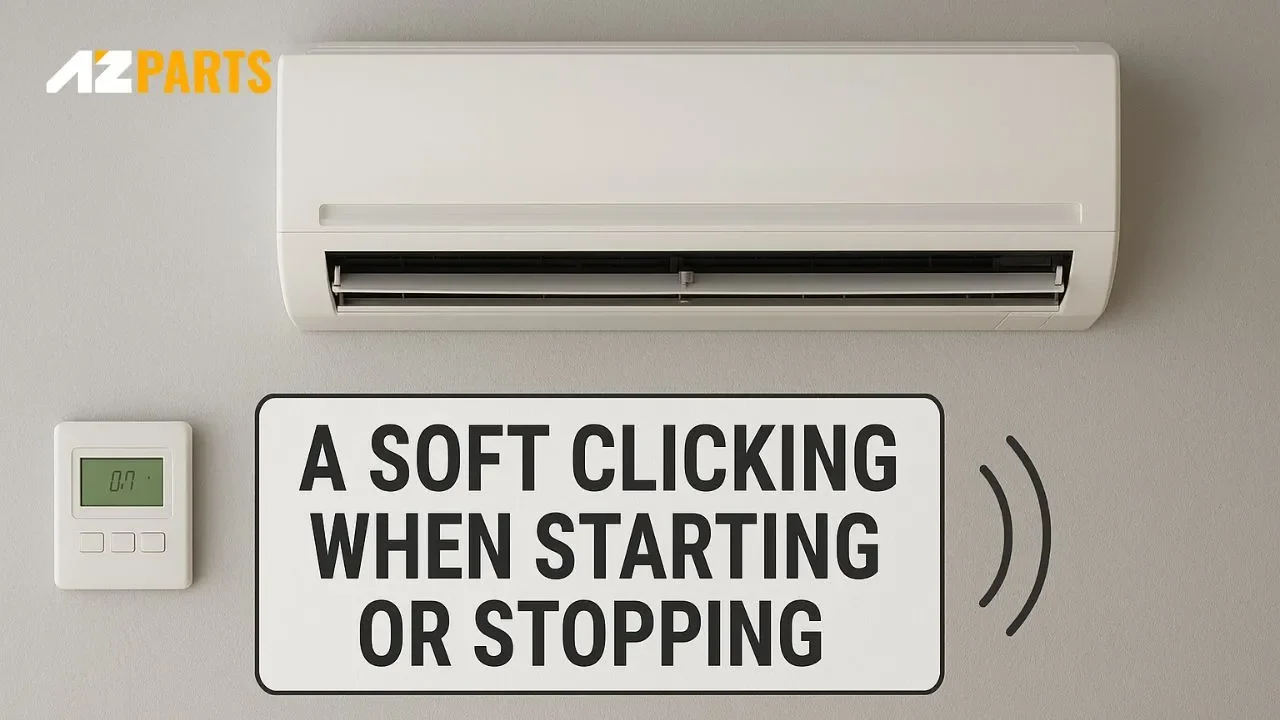
A soft clicking sound comes from the relays or the thermostat (Source: AZParts)
2.3 Low Rumble or “Plane Launching” Sound
During operation, especially when the compressor starts up, your system might emit a low rumble or a sound similar to a distant airplane taking off. This is usually the compressor or fan motor building up speed and is a normal part of system function. If the rumble becomes loud or is accompanied by vibrations or clanking, further inspection may be necessary, but under normal conditions, this startup noise is harmless.
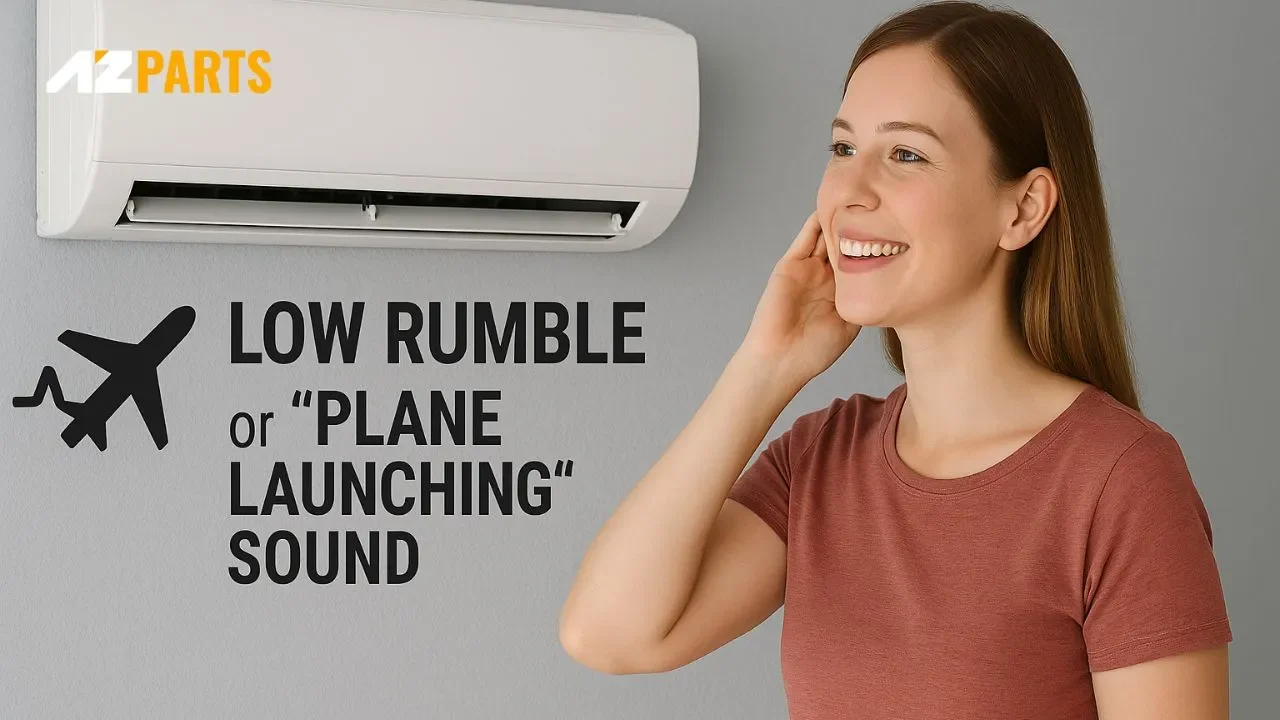
During operation, your AC might emit a low rumble or a sound similar to a distant airplane taking off (Source: AZParts)
3. FAQ – Quick Answers About AC Noise
3.1 What Does It Mean When My AC Is Making Noise?
When your air conditioner makes unusual noises, it may be a sign of a mechanical issue or a part that is wearing out. Sounds like banging, screeching, buzzing, or rattling often indicate problems such as loose parts, motor issues, or electrical malfunctions. Identifying the type of noise and when it occurs can help diagnose the issue before it becomes more serious.
3.2 Is It Normal for My Air Conditioner to Make a Hissing Sound?
A soft hissing sound can sometimes be normal as refrigerant flows through the system. However, a loud or continuous hissing noise may signal a refrigerant leak, a damaged air duct, or a faulty expansion valve. In such cases, it is best to turn off your system and contact an HVAC technician to inspect the unit for any leaks or pressure problems.
3.3 What Does a Bad Compressor Sound Like?
A failing compressor often produces loud banging, clanking, or grinding noises during operation. These sounds occur when internal parts become loose or damaged. If the compressor is struggling to start, you may also hear a loud humming followed by a click. Because the compressor is a critical and expensive part of the system, it is important to address these sounds quickly to avoid further damage.
3.4 When Should I Replace a Noisy Air Conditioner?
You should consider replacing your air conditioner if it consistently makes loud or unusual noises despite regular maintenance or repairs. Frequent breakdowns, poor performance, and noises such as grinding or rattling may indicate that the system has reached the end of its lifespan. Replacing it with a newer, quieter, and more efficient model can improve comfort and reduce energy costs in the long run.
A noisy air conditioner is more than just an annoyance, it’s often a warning sign that something’s wrong. From faulty fan motors to worn-out compressors, catching the issue early can save you time, money, and discomfort. Whether you need replacement parts or expert tips, AZParts is here to help you get your cooling system back in quiet, smooth operation. Explore our wide range of air conditioner replacement parts and resources today to restore the peace in your home.
Learn more about other AC problems and how to fix them:
Contact Info
Address: 8 The Green, Ste A, Dover, Delaware 19901-3618, United States
Email: support@azparts.com
Air conditioner
Further Reading
Further Reading





